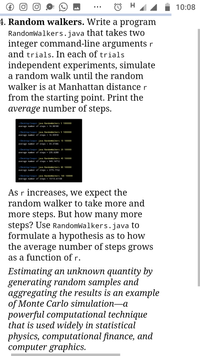
Database System Concepts
7th Edition
ISBN: 9780078022159
Author: Abraham Silberschatz Professor, Henry F. Korth, S. Sudarshan
Publisher: McGraw-Hill Education
expand_more
expand_more
format_list_bulleted
Question

Transcribed Image Text:(€)
10:08
••.
4. Random walkers. Write a program
RandomWalkers.java that takes two
integer command-line arguments r
and trials. In each of trials
independent experiments, simulate
a random walk until the random
walker is at Manhattan distance r
from the starting point. Print the
average number of steps.
-/Desktop/loops> java Randomwalkers 5 1000000
average number of steps = 14.98188
-/Desktop/loops> java Randomlalkers 5 1000000
average number of steps = 14.93918
-/Desktop/loops> java Randomlalkers 10 100000
average number of steps = 59.37386
-/Desktop/loops> java Randomlalkers 20 100000
average number of steps = 235.6288
-/Desktop/loops> java Randomwalkers 40 100000
average number of steps = 949.14712
-/Desktop/loops> java Randomwalkers 80 100000
average number of steps = 3775.7152
-/Desktop/loops> java Randomwalkers 160 100000
average number of steps = 15113.61108
As r increases, we expect the
random walker to take more and
more steps. But how many more
steps? Use RandomWalkers.java to
formulate a hypothesis as to how
the average number of steps grows
as a function of r.
Estimating an unknown quantity by
generating random samples and
aggregating the results is an example
of Monte Carlo simulation–a
powerful computational technique
that is used widely in statistical
physics, computational finance, and
сотрuter graphics.
Expert Solution
This question has been solved!
Explore an expertly crafted, step-by-step solution for a thorough understanding of key concepts.
This is a popular solution
Trending nowThis is a popular solution!
Step by stepSolved in 2 steps

Knowledge Booster
Learn more about
Need a deep-dive on the concept behind this application? Look no further. Learn more about this topic, computer-science and related others by exploring similar questions and additional content below.Similar questions
- Java Questions - (Has 2 Parts). Based on each code, which answer out of the choices "A, B, C, D, E" is correct. Each question has one correct answer. Thank you. Part 1 - Given the following code, the output is __. class Sample{ public static void main (String[] args){ try{ System.out.println(5/0);}catch(ArithmeticException e){ System.out.print("Divide by zero????");}finally{ System.out.println("5/0"); } }} A. Divide by zero????B. 5/0C. Divide by zero????5/0D. 5/0Divide by zero????E. "5/0" Part 2 - Given the following code, the output is __. try{ Integer number = new Integer("1"); System.out.println("An Integer instance.");}catch (Exception e){ System.out.println("An Exception.");} A. An Integer instance.B. An Exception.C. 1D. Error: ExceptionE. None of the optionsarrow_forwardpublic static int test(int n, int k) { if (k == 0 || k == n) { return 1; } else if (k>n) { return 0; } else { return test(n-1, k-1) + test(n-1, k); } ww For each of the following calls, indicate the output that is produ test(7,5); test(6,4); test(4,5); test(8,3); test(5,5);arrow_forwardWrite a complete Java program that allows users to enter two integer numbers as follows: pleaes Enter the first number: 2 please Enter the Second number: 2 Upon providing the two integer numbers, the users should be given a list of operations to select from, as follows: please choose the operation you want to do with these numbers by Enter a,b or c: a- adding b- multiplying c- average Based on the users’ selection, a method should be called to perform the selected operation and return the result. After that the main method should print the result. The output of the program should be as follows in the picture:arrow_forward
Recommended textbooks for you
 Database System ConceptsComputer ScienceISBN:9780078022159Author:Abraham Silberschatz Professor, Henry F. Korth, S. SudarshanPublisher:McGraw-Hill Education
Database System ConceptsComputer ScienceISBN:9780078022159Author:Abraham Silberschatz Professor, Henry F. Korth, S. SudarshanPublisher:McGraw-Hill Education Starting Out with Python (4th Edition)Computer ScienceISBN:9780134444321Author:Tony GaddisPublisher:PEARSON
Starting Out with Python (4th Edition)Computer ScienceISBN:9780134444321Author:Tony GaddisPublisher:PEARSON Digital Fundamentals (11th Edition)Computer ScienceISBN:9780132737968Author:Thomas L. FloydPublisher:PEARSON
Digital Fundamentals (11th Edition)Computer ScienceISBN:9780132737968Author:Thomas L. FloydPublisher:PEARSON C How to Program (8th Edition)Computer ScienceISBN:9780133976892Author:Paul J. Deitel, Harvey DeitelPublisher:PEARSON
C How to Program (8th Edition)Computer ScienceISBN:9780133976892Author:Paul J. Deitel, Harvey DeitelPublisher:PEARSON Database Systems: Design, Implementation, & Manag...Computer ScienceISBN:9781337627900Author:Carlos Coronel, Steven MorrisPublisher:Cengage Learning
Database Systems: Design, Implementation, & Manag...Computer ScienceISBN:9781337627900Author:Carlos Coronel, Steven MorrisPublisher:Cengage Learning Programmable Logic ControllersComputer ScienceISBN:9780073373843Author:Frank D. PetruzellaPublisher:McGraw-Hill Education
Programmable Logic ControllersComputer ScienceISBN:9780073373843Author:Frank D. PetruzellaPublisher:McGraw-Hill Education

Database System Concepts
Computer Science
ISBN:9780078022159
Author:Abraham Silberschatz Professor, Henry F. Korth, S. Sudarshan
Publisher:McGraw-Hill Education

Starting Out with Python (4th Edition)
Computer Science
ISBN:9780134444321
Author:Tony Gaddis
Publisher:PEARSON

Digital Fundamentals (11th Edition)
Computer Science
ISBN:9780132737968
Author:Thomas L. Floyd
Publisher:PEARSON

C How to Program (8th Edition)
Computer Science
ISBN:9780133976892
Author:Paul J. Deitel, Harvey Deitel
Publisher:PEARSON

Database Systems: Design, Implementation, & Manag...
Computer Science
ISBN:9781337627900
Author:Carlos Coronel, Steven Morris
Publisher:Cengage Learning

Programmable Logic Controllers
Computer Science
ISBN:9780073373843
Author:Frank D. Petruzella
Publisher:McGraw-Hill Education